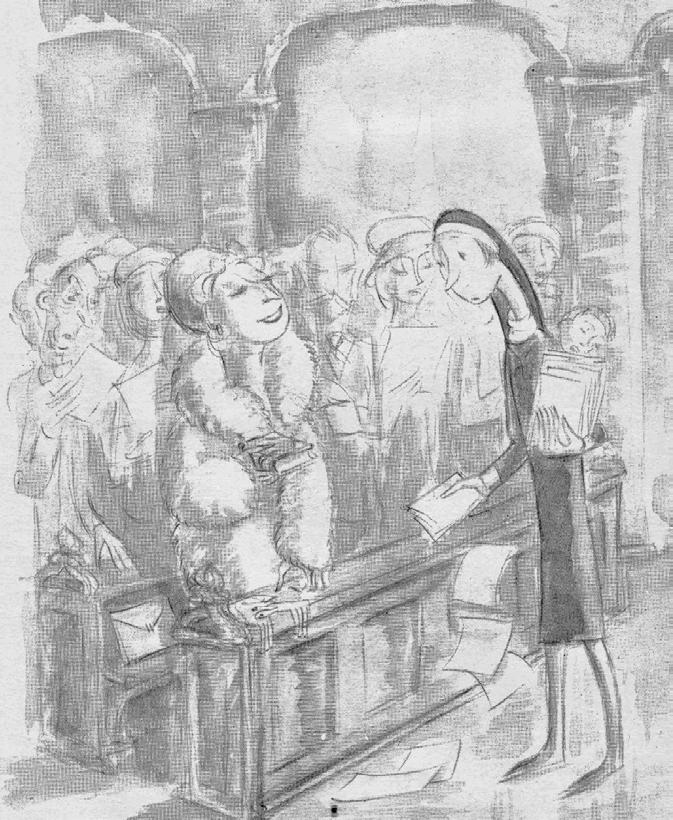
3 minute read
Preserving that patrimony
Joseph Shaw on new initiatives for 2019
In my last Chairman’s Message I announced new membership rates, and new options for supporting the Latin Mass Society. The Society deserves support, naturally, insofar as it is active, and in this issue, I am pleased to announce a series of new initiatives which I hope will serve to remind readers of just how active it is.
First, we are reviving the Society of St Tarcisius, the LMS’ own Altar Servers’ Guild. This was founded some years ago but for various reasons it was difficult to maintain momentum with it. We are now committed to organising a series of training days, when members can also be enrolled: we are advertising three in London over the next six months, and in due course there will be events outside London too. Among other things the Guild will have a die-cast, enamelled servers’ medal: as I write it is being manufactured for us, and readers can see the artwork.
Second, one of the Society’s unexpected successes of the last couple of years has been the Guild of St Clare: a group dedicated to the making and mending of liturgical vestments. A couple of reports have appeared in Mass of Ages about their ‘Sewing Retreats’, weekends of ora et labora, work and prayer, with the Traditional Mass and spiritual talks from a priest. These now take place twice a year but book out months in advance. The Guild of St Clare is now arranging a series of sewing days in London to allow a larger number of people to take part in its projects, which, because they require a wide variety of work, can be assisted by people at every level of expertise.

Society of St Tarcisius die-cast, enamelled servers’ medal
Third, the development of Gregorian Chant, and also of the singing of sacred polyphony, in the context of the Traditional Mass in England and Wales, has been one of our great long-term success-stories. The number of sung Traditional Masses has enormously increased in the decade since Summorum Pontificum freed the ancient Mass, and the standard of chant at these Masses has increased tremendously at the same time. Demand for singers continues to challenge supply. We have long organised an annual Chant Training Weekend, this year taking place in the Oratory School, and this year we are launching a new Chant schola in London, to train a new generation of singers: the Schola Cantorum Ioannis Houghton, named after the proto-martyr of Henry VIII’s revolt from Rome, St John Houghton, Prior of the London Charterhouse. They will be singing once a month in Corpus Christi, Maiden Lane, in London, in the first instance.
Fourth, we know that our members and supporters need space to talk and to think, to make connections between the ancient Mass and its profound spirituality, and their own lives in the darkening world around us, which increasingly resembles the decadent paganism of the Roman Empire, without the fun. This year we are launching the ‘Iota Unum’ series of talks, one a month, to take place in the basement of Our Lady of the Assumption, Warwick Street, in London, with some very distinguished speakers.
Full details of all these initiatives can be found on the LMS website.

'No thanks, Sister, I'll slog along with the last one--issued on July 19th, 1570.'
From Cracks in the Clouds, Dom Hubert van Zeller (erstwhile Br Choleric), 1976.
The Latin Mass Society has a hard won reputation for slogging on—like the rather grand lady in this issue’s cartoon. We slogged on with the old Mass through some pretty tough times, and I never cease to be grateful for those older members, many now gone to their reward, who did the slogging. Today we are called on to make the best of what is something of a renaissance for the old liturgy, even while the decline of the general culture in which we live accelerates, bishops around the world are engulfed in a moral crisis, and the trumpet from Rome sounds an uncertain note.
These things are not unrelated. The crisis of society and of the Church alike represent the unravelling of the idea that normal, civilised, life could be continued while certain key elements of our ancient spiritual patrimony are rejected. As it unravels, more people are going to see the need to do what we are doing: preserving that patrimony. In the meantime, it will continue to sustain us through the most difficult times: and not just to sustain us, but to give the energy and motivation to rebuild, even while so many edifices seem to be crumbling around us.










